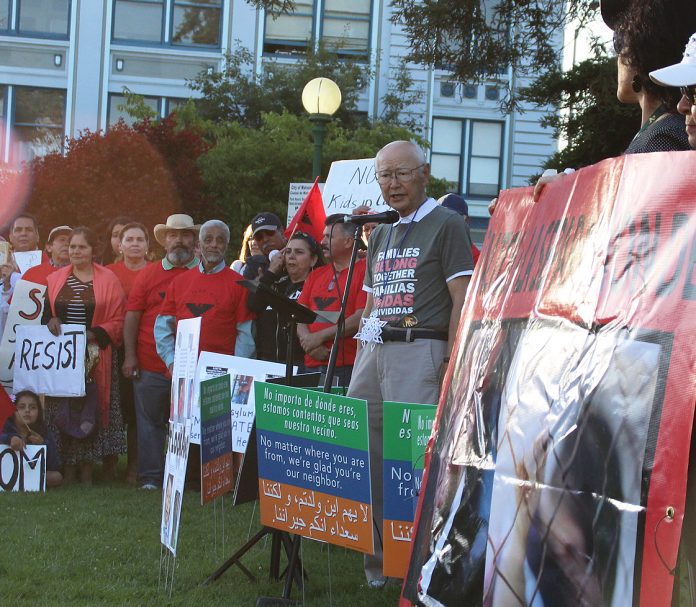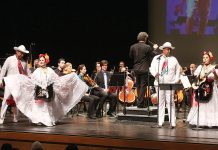
Editor’s note: This is the fourth and final entry of a weekly series about the Pajaro Valley’s Japanese community. The series’ culmination coincides with this year’s celebration of the Obon Festival, a cultural and religious Japanese event honoring one’s ancestors. Read the first entry in the July 24 edition of the Pajaronian, the second in the July 31 edition and the third entry in the Aug. 7 edition.
By Hugh McCormick, Special to the Pajaronian
WATSONVILLE—Through sheer force of will, and a little luck, Goro Yamashita’s “Uncle Tom” was able to piece together a “new” Yamashita Grocery following World War II—in the same location and building it sits in today. The tiny, hole-in-the-wall operation on Union Street has survived by word-of-mouth and those “in the know.” Loyal customers have been coming to the Yamashita family for their tofu, noodles, mochi, vegetables (Kyuri, ginger, scallions), Sake, Natto and Japanese sweets for decades.
“When I don’t feel good, I go to Yamashitas and buy Japanese food. That’s the best food for you. Whatever you grew up on. You have the enzymes that break it down and give you the nutrition your body needs,” said Mas Hashimoto, a well-known community organizer.
Recently, a new generation of Yelp-and-Google-driven hipsters has discovered the Market, Yamashita said.
“Since sushi got more popular, a lot more non-Asian people are shopping here,” Yamashita said. “They want to make Japanese noodles, and their own sushi themselves. A lot of non-Japanese are buying Japanese goods. Hispanic, white… eating habits have changed. People crave variety. Something different. So they come to us. We’re seeing a younger, hipper crowd.”
And many are seeking fresh (not-languishing-for-weeks-in-weird smelling-juices) tofu.
For decades, the Yamashitas relied on a local tofu company named Murata—one of the last four remaining Japanese family-run businesses in the area (there was Murata, Yamashita, Wada and Bridge Street Grocery)—for its fresh product.
“Murata and the other businesses closed down, sadly,” Yamashita said. “They had no kids or relatives who wanted to take over their operations. Now, we’re the last ones here.”
With Murata closed, Yamashita’s had to scramble to find a new supplier—one that could match Murata’s delicate (but not mushy) texture and consistency. The artisan tofu from Sunnyvale’s Gombei Tofu fit the bill nicely. People call ahead, and pre-order their week’s supply and pick it up each Thursday. The tofu is sold in blocks and made the same day. There can be lines and it sells out quickly.
“Once a week, as we have done for decades, we offer our customers the freshest, finest tofu around,” Yamashita said.
It’s not just the tofu that sets Yamashita Grocery apart. The small storefront may not have the quantity of say, an Asian supermarket in San Jose, but its selection and variety of Japanese goods rivals anything in Santa Cruz County.
“Yamashita’s has the look, feel and smell of similar shops in Japan. It is not a slick store like you’ll find in Japan Center in San Francisco or even Japantown in San Jose. It reflects the history of the Watsonville Japanese. No airs. No pretenses. They’ve got Japanese stuff floor to ceiling. If you need ingredients for a Japanese dish, they’ll have it,” said Sandy Lydon, Historian Emeritus at Cabrillo College.
Like everyone else these days, the folks at Yamashita Grocery have had to change and adapt the way they run their business in the face of Covid-19. Customers are asked to wear masks when they enter, and only a certain number of shoppers are allowed in the already-cramped space at a time. Surprisingly, the coronavirus has been good for business, Yamashita said.
With more and more customers deciding to “shop local,” the Yamashita family has struggled to keep up with rising demand for some Japanese staples. Signs are posted limiting the types and quantities of Ramen, Soba and Udon noodles people can buy each day.
“We were seeing panic buying here. People were going crazy. Things have cooled off a little, but now, people don’t want to drive large distances—like over the hill,” Yamashita said. “So we’re seeing quite a few new customers. Lots of ‘I didn’t know you were here’ stuff. Our business has picked up.”
While Yamashita Grocery has no sign that screams “BEST (or only) JAPANESE GROCERY” in South Santa Cruz County, it does have an American flag (albeit a tiny, faded one) hanging in the window. The Yamashitas, like many of Watsonville’s Japanese residents, are patriots. They love and are proud of their country and their hometown despite the adversity they have faced.
“We feel like we live in a good country. When we travel to Japan on business or to see family, we’re like ‘I just want to go home now,’” Yamashita said. “This is home. We are comfortable here, and we were born here. It’s a country of immigrants. A melting pot. We’re proud to be Americans.”
After struggling for many years, Japanese Americans such as the Yamashitas and Hasimoto, said they have begun to feel accepted and free to be a valued part of their community. The discrimination and overt racism that dominated decades of life for the Pajaro Valley’s Japanese is all but gone, and those that lived through Arizona’s Poston Camp now use that experience to teach the next generation.
The now-thriving Watsonville-Santa Cruz chapter of the Japanese American Citizens League (JACL) moved into its “new Toyo Hall” in 1984. Since then, it has quickly grown into one of the largest and most politically active chapters (among 100) in the United States—behind only Seattle, Chicago and Portland. The local chapter of the JACL, the oldest and largest Asian American civil rights organization in the United States, has brought attention to issues such as the American government separating children from their families on the U.S.-Mexican border, and even organized a Muslim forum to bring awareness of Islam to Santa Cruz County.
“The local Japanese community knows what happens when racism rears its ugly head,” Lydon said. “The JACL is working hard to combat it.”
Composed of a wide variety of members, including Mexicans, Croatians and Italians, the Watsonville-Santa Cruz chapter of the JACL is on an ongoing mission to secure and maintain the civil rights of Japanese Americans and all others who are victimized by injustice and bigotry, Hashimoto said.
“Watsonville welcomes immigrants. It always has. They can be from Mexico, El Salvador…. everywhere,” Hashimoto said. “Here we live quiet lives in harmony, peace, respect for others and the love of nature. We have the best climate, cleanest air and cleanest water anywhere. Best soil, too. Topsoil that goes down 60 feet. We also have the best food. And we have the best people.”
It’s easy to overlook Yamashita Grocery. The store is a survivor—an understated, pink-and-peely icon—and one of the last reminders of an oft-forgotten community and culture that once dominated the fields and streets of Watsonville. There are no signs pointing travelers to the market’s bounty, or to the humble and wise Yamashita family itself. But they are there, and well worth the trip to Watsonville—for a history lesson if nothing else.
“Watsonville is famous among the Japanese Americans for the many families that got their start here,” Hashimoto said. “In the Japanese community, Watsonville is as famous as San Francisco, San Jose and other metropolitan areas. Japanese know Watsonville.”










